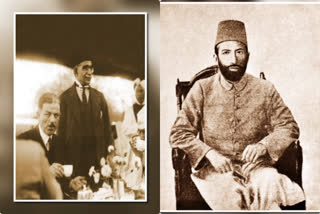New Delhi: Jamia Millia Islamia, one of the most prestigious universities in India was born out of Mahatma Gandhi's call for a non-cooperation movement to resist the Britishers. The University established on October 29, 1920, passed over a century and it has been playing a pertinent role in the socio-political discourse of the country.
Jawaharlal Nehru had termed it as the “lusty child of Gandhian non-cooperation movement.” While India celebrates 75 years of Independence, it is pivotal to turn the pages and pay tribute to the founding members of Jamia, Dr Mukhtar Ahmed Ansari (MA Ansari) and Hakim Ajmal Khan.
Not only did they spearhead the establishment of JMU but also extended their relentless support to the freedom struggle by treating agitators and revolutionaries. Dr Ansari served as the Vice-Chancellor of JMU from 1928 to 1936. The member of Congress and Muslim League turned out to be the reliance for freedom fighters who faced health issues.
Historian Sohail Hashmi said that Dr MA Ansari played important role in the country’s struggle for independence through healthcare. In those days, three great surgeons were famous in India and those were Dr Bidhan Chandra Rai of Calcutta, Mirajkar of Mumbai and Dr Mukhtar Ahmed Ansari of Delhi. In Daryaganj of Delhi, Dr M.A.Ansari had a big house, where key delegates who attended the Congress session held in Delhi used to come and stay.
Healing touch of Jamia that ushered in an era of freedom Recalling, Hashmi said that many freedom fighters used to come for Dr Ansari’s treatment and he used to give them shelter in his house. Hashmi added that freedom fighters with different ideologies, whether it be Congress, Socialist, Communist or people of the underground movement, everybody used to come to Dr Ansari and took shelter at his house when needed. Sharing an intriguing anecdote, Hashmi said that Mahatma Gandhi used to ask freedom fighters who their king is when they came to Delhi and people used to say the name of Dr Ansari.
The non-cooperation movement started in 1920 and prominent leaders including Shaukat Ali, Mohammad Ali, Maulana Abdul Kalam Azad along with Gandhi revolted against the British education system. In response to the call to boycott all educational institutions supported or run by Britishers, a group of nationalist teachers and students walked out of Aligarh Muslim University, thus marking their dissent against the University’s pro-British inclinations. It included Maulana Mehmud Hasan, Maulana Mohamed Ali, Hakim Ajmal Khan, Dr. Mukhtar Ahmad Ansari, and Abdul Majid Khwaja.
Initially, classed began on a rented building and after few years Hakim Ajmal Khan, Dr. Mukhtar Ahmed Ansari and Abdul Majeed Khwaja with Gandhi’s support shifted Jamia from Aligarh to Karol Bagh in New Delhi in 1925. Gandhi had said, “The Jamia has to run. If you are worried about its finances, I will go about with a begging bowl”.
Historian Hashmi elaborated, “Education initially began in a rented building, a few years later, Jamia was shifted to Karol Bagh in Delhi and Hakim Ajmal Khan bore most of the expenses. Ajmal Khan returned the title of scholar given by the British. As an honour to Ajmal Khal, he was given the title of Masih-ul-Mulk by Indians.”
Ajmal Khan's father had constructed a hospital at Sharif Manzil in Ballimaran. But gradually Sharif Manzil turned into Congress office and every Congress Working Committee meeting in Delhi were held there.
All institutions of Jamia except Jamia Press, the Maktaba and the library were shifted to the new campus later. In 1927, Ajmal Khan passed away and Jamia was at crossroads financially. In 1934 Dr Ansari passed away and both of them were laid to rest on the soil of Jamia. When the going gets tough, the tough get going, cannot be more true about Jamia and Ajmal Khan, Dr Ansari's contributions got transcended as generations of students from Jamia impact the country's social fabric.
Also read:75 Years of Independence: Youth who traded his life for precious time in saving Kashmir
